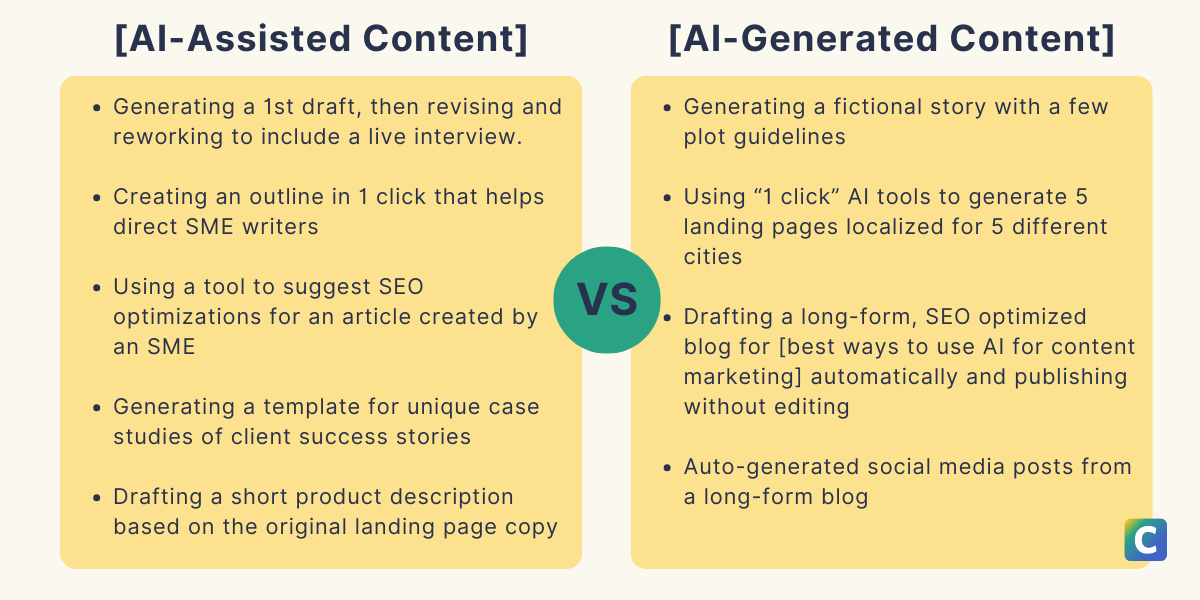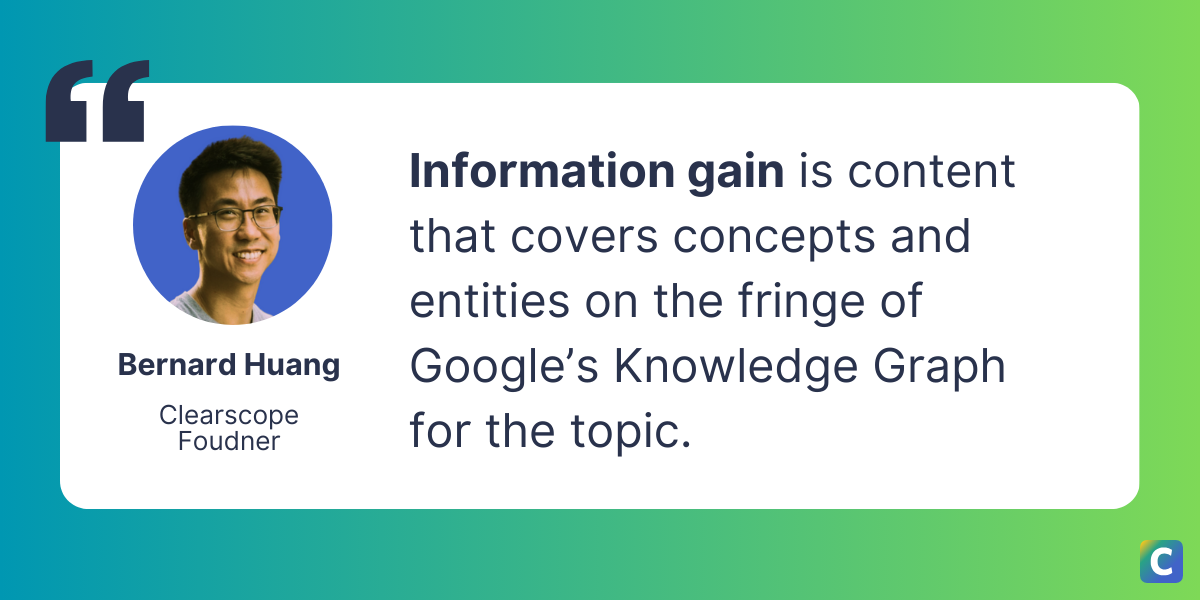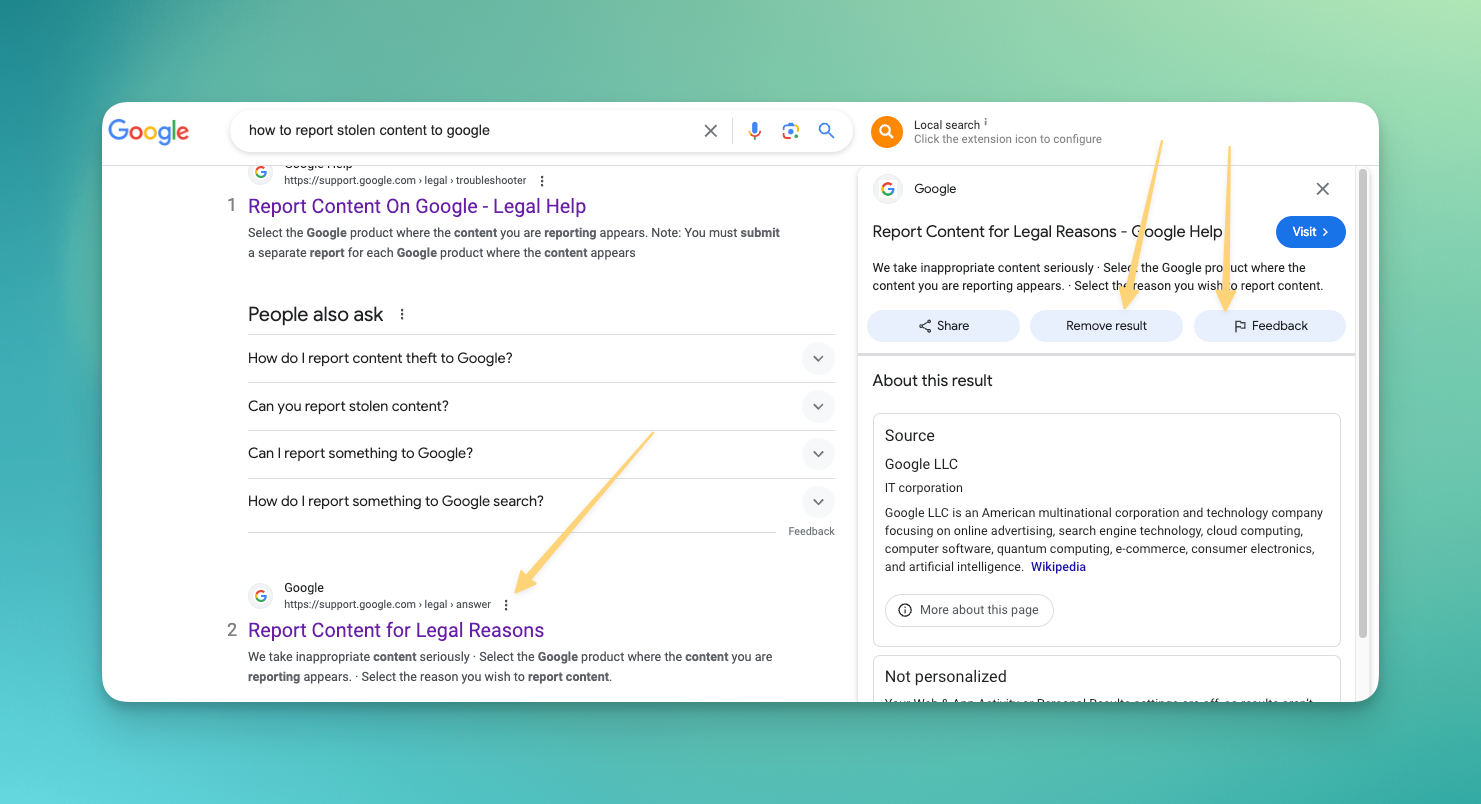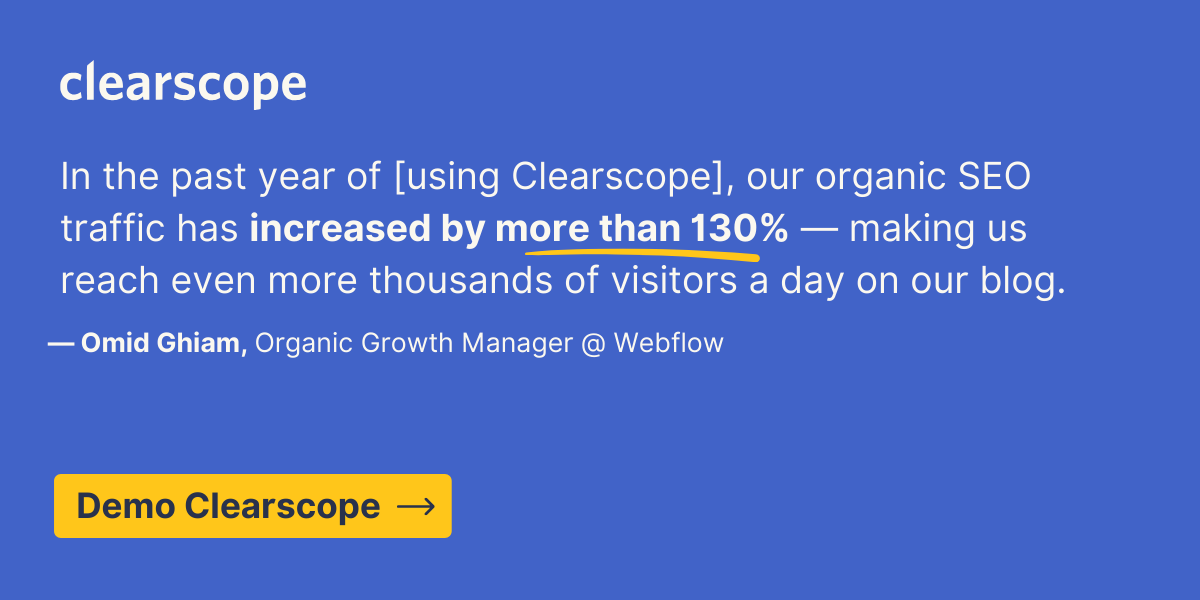Can You Copyright Your AI Generated Content?
Topic: AI Content
Published:
Written by: Bernard Huang
AI is changing what we do and how we do it—and fast. With Google’s May 2024 rollout of AI Overviews, there are more questions than ever buzzing in the SEO crowd.
At Clearscope, we get a lot of questions from concerned clients about AI-generated content.
As an experienced content strategist myself, I have them too.
Call me a nerd, bookworm, or whatever, just don’t call me late for dinner (okay, that's the only nerdy joke I'm throwing in this article—I'm done now), but one of my favorite classes in college way back in the day was intellectual property and copyright law.
I personally find the topic of “who owns what” and the boundaries of fair use incredibly fascinating, especially as someone who has ghostwritten content for others over the years.
Is purely AI-generated content considered the same thing as a hired work by a ghostwriter?
Can one actually own the intellectual property rights to a machine-generated work like they can with hired articles created by freelancers?
While the courts will have to decide the answers to those questions, I dug in to find out more about protections for AI content… and I’ve got a few solutions and recommendations for you, too.
A quick note here: At Clearscope, we’re SEO and content marketing experts, not legal professionals, and laws vary depending on where you live and work. Make sure to connect with a legal professional if you have legal questions.
Who owns your AI generated content?
The answer to this question, like most questions in content-led SEO work, is it depends—it depends on if your creative work in question is fully generated by AI or if it is AI assisted with the content creation being led by a human author.
We’re currently living while AI history is being made, and the courts are still working to figure out definitive answers where legal ownership and protections for AI-generated work is concerned.
But for now, in addition to how much a human was involved in the content creation process, official ownership of your AI generated content also depends on if you’re seeking U.S. copyright or patent protection.
Content fully created by AI
If you’ve solely relied on AI to generate the content or creative work with little to no human input, it’s likely you do not own your content and it could be considered public domain, according to principles recently applied by the U.S. Copyright Office. (source, source)
At Clearscope, we call this “AI generated content,” and we advise against relying on solely AI generated content for your content-led SEO strategy and marketing efforts.
And so does Google. Read more about that here.

Examples of AI-assisted and AI-generated content.
Content created with AI assistance
Content that you’ve created with the assistance of AI is a different story—and it’s likely that you do own this content… or at least the parts of it that were originally created by you.
According to Reuters, in October 2020 “the U.S. patent office took the position that a human would not be disqualified from inventorship because he or she used an AI as a tool in making an invention.” (source).
I’m not a legal pro—just a perpetually curious content-led SEO nerd—but the phrase “as a tool” sticks out to me here.
Logically, it makes sense that if you used AI as an assistant to create content, rather than relying on it for one-click content generation, that you could retain ownership of intellectual property rights to the part of that creation that is yours.
Can you copyright AI generated content?
We’re not lawyers (so get in touch with a legal pro if you need one!), but according to the Copyright Alliance, if your content is completely AI generated, it’s not likely you’ll be able to copyright it. (source)
For example, an AI-generated image that involves no human authorship or artistry outside of a few prompts.
However, if your content is AI assisted, with some parts being human created and others AI-generated or assisted, the parts that are created by you (ie, a human) can likely be copyrighted. (source)
This could look like using an AI chatbot to edit your draft for grammatical issues or write a simple introduction to a long-form article by a human author.
For a detailed account of the distinction between AI-generated and AI-assisted content—and which parts of an AI-assisted work can be copyrighted—take a look at this 2023 decision from the U.S. Copyright Office about the work Zarya of the Dawn.
But keep in mind: These concepts are being debated back and forth across industries, countries, and courts.
READ MORE: AI-assisted vs. AI-generated content
Being able to copyright (or own) AI-generated or AI-assisted content can also depend on if that content was created in the artistic style of another human creator.
In a class action lawsuit of creators against the AI tool Midjourney, “artists argue that, not only should Midjourney itself be treated as an unauthorized (and therefore infringing) derivative work, but also that when AI tools rely on an artist's work in creating an image, the user of the AI tool is liable for infringement” (source).
What does that mean exactly?
Well, if you use an AI content generator tool to create an image in the style of another artist’s copyrighted material, you could have participated in copyright infringement, depending on the laws in place where you live.
While this example pertains to visual art, it’s also another reason to remain cautious when producing AI generated content for drafted, written content for SEO or content marketing purposes.
The lines are a bit blurry—at least, for now—regarding who the copyright owner is for works generated in the style of other human creators and what exactly qualifies as fair use in these cases.
Some U.S. states are taking additional preliminary measures to protect creators from being ripped off by AI generated content.
In Tennessee, the aptly named Ensuring Likeness Voice and Image Security (ELVIS) Act is the first of its kind in the U.S. to protect creators in the music industry (source).
Under these guidelines, in theory, if a person writes a song (and owns the copyright) but records it with AI music generation tools in the style of another artist, that artist could have a case to protect their likeness… even if they don’t own the song content.
It’s easy to see there are some big ethical concerns here with the growing use of AI-generated content for creative works and the need to protect copyrighted works birthed out of old-fashioned human creativity.
And in the SEO and digital marketing world, many of those concerns are about how Google is using the content to answer search queries.
Many site owners and publishers are increasingly concerned about Google’s AI Overviews stealing their content and reducing organic traffic.
In fact, a group of French publishers won a court battle against Google using their content without attribution within AI Overviews in search, and U.S. content creators are raising the same legal concerns (source).
How to differentiate your AI-assisted content from AI-generated content
If you’re concerned about retaining ownership of your original content—especially if you use AI tools to assist with content production—you need to know about the concept of information gain.
At Clearscope, we define information gain as a signal of your content's uniqueness in comparison to consensus content on the web.

You create information gain through sharing survey data, customer testimonials, case studies, interviews, personal stories and experiences, and new perspectives.
The best way to make sure you own your content—AI-assisted or otherwise?
Well… make sure you actually own the ideas inside of it.
Your original content should contain new information that isn’t AI-generated and provides actual new insights and perspectives. That’s something that AI can’t do.
Plus, it’s just a good, healthy practice—no one needs more consensus, copycat content.
And if your content is scraped or stolen by an AI content generation tool?
Well, that’s a bit easier to prove when your content contains information gain (and isn’t generic consensus content), if you have original stories, perspectives, and data that has not been correctly attributed.
If you’re concerned about this, take a look at our article that answers the question Can you stop Google from serving your content in AI overviews—and should you?
Read more:
What to do if you find your original or AI-assisted content is being copied
So, if AI content generators are operating off of consensus content they find across the web, what happens if your original content has been copied and not attributed—via Google or otherwise?
If you think another publisher has copied your original content, or used your proprietary information gain content without correct attribution, there are a couple things you can do:
Attempt to resolve it by contacting the site owner and resolving the issue without legal action.
If the site owner doesn’t respond or refuses, you can file an official DMCA (Digital Millennium Copyright Act) takedown notice.
Report content issues to Google directly here.
Report or give feedback to content directly in search results.

Here's how to report results directly from Google SERPs (Search Engine Results Pages): You can report issues found directly in google results by selecting the vertical ellipses next to a page URL in the SERP. From there, you have the option to select remove result or to provide feedback on the issue.
I’ve used the search results feedback feature several times when I’ve come across clearly incorrect or misleading information.
While it’s up to Google to decide exactly what to do with that feedback, I will say it makes me feel super powerful—even for just a moment—when I flag those search results that are blatantly misleading or contain expired information that’s no longer accurate.
But what if you’re coming across incorrect, stolen, or misleading information in Google’s new AI Overviews feature?
Take the following steps:
Click the “Learn more” in the top right corner of the AI Overview.
Select the “Feedback” button.
Choose the section of the AI Overview answer you’re providing feedback for.
Select the category of feedback and leave comments if needed
Ultimately, if you have reason to believe your content has been plagiarized by an AI content generation tool or a publisher, seek advice from a legal professional.
We are in no way advising you on what legal actions you should take (if any!), but according to actual legal pros at Romano Law, “If you see that AI has copied your work, you may want to join a class action lawsuit, like that filed against GitHub and Open AI.”
However, reporting it through the channels mentioned above is a great first step.

Should You Use Ai-Generated Content in Your SEO Strategy?
If you’re looking for ways to save time, AI content generation is a tempting option. But does it work? Should you use it? Check out our guide to learn more.
Read moreWhat Is the Difference Between Ai-Assisted and Ai-Generated Content?
Discover how to effectively use AI in your SEO content strategy while avoiding common pitfalls of AI-generated content.
Read moreInformation Gain in SEO: The Guide to Convincing Yourself, Team, and Clients to Rethink Current Strategies
What is information gain? Why is everyone talking about it? This is the guide you need to persuade yourself, your team, and your clients to reassess your current strategy to include info gain in your content.
Read more